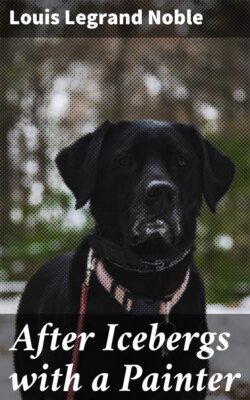Читать книгу After Icebergs with a Painter - Louis Legrand Noble - Страница 13
На сайте Литреса книга снята с продажи.
CHAPTER X.
ОглавлениеTable of Contents
THE RIDE TO TORBAY.—THE LOST SAILOR.—THE NEWFOUNDLAND DOG.
Thursday, June 23. We were stirring betimes, making preparations for our first venture after an iceberg. Unluckily, it was a Romish holiday, and every vehicle in town seemed to be busy carrying people about, by the time we thought it necessary to engage one for ourselves. We succeeded at length in securing a hard-riding wagon, driven by a young Englishman, and were soon on our way, trundling along at a good pace over the smooth road leading from St. Johns to Torbay, the nearest water to our berg, and distant some eight or nine miles. The morning was fine, the sunshine cheering, the air cool and bracing, and all went promisingly. The adjacent country is an elevated kind of barren, clothed with brushwood, spruce and birch, crossed by numerous little trout brooks, and spotted with ponds and wet meadows, with here and there a lonely-looking hut. But there were the songs of birds, the tinkling of cow-bells, and the odor of evergreens and flowers. A characteristic of the coast is its elevation above the country lying behind. Instead of descending, the lands rise, as you approach the ocean, into craggy domes, walls and towers, breaking off precipitously, and affording from the eminences of our road prospects of sparkling sea. Our hearts were full of music, and our minds and conversation were a kind of reflection of the solitary scene. For months, our young man tells us, the snow lies so deeply along this fine road as to render it impassable for sleighs, except when sufficiently hard to bear a horse. The snow-shoe is then in general use. One of the pests of early summer is the black fly, as we have already experienced. A few years ago, a sailor ran away from his vessel, at St. Johns, and took to these bushy wilds, in which, at length, he got lost, and finally perished from the bites of this pestilent fly. He was found accidentally, and in a state of insensibility, being covered with them, and so nearly devoured that he died within a few hours after his discovery.
Speaking of the Newfoundland dog, he told us that one of pure, original blood, was scarcely to be found. I had supposed, and had good reason for it, from what I had read in the papers, about the time of the visit to St. Johns, upon the laying of the Atlantic Cable, that any person could for a small sum purchase numbers of the finest dogs. I think a certain correspondent of some New York daily, told us that several gentlemen supplied themselves with these animals upon their departure. If such was the case, then they took away with them about the last of the real breed, and must have paid for them such prices as they would not like to own. Scarcely a splendid dog is now to be seen, and five, ten, and even twenty pounds sterling might be refused for him. We have not seen the first animal that compares with those which trot up and down Broadway nearly every week; and they are not the pure-blooded creature, either, by a good deal. It is to be regretted, that dogs of such strength, beauty and sagacity should have been permitted to become almost extinct in their native country.
